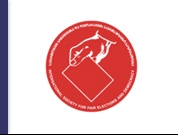ISFED Concerns on the Selection Process of CEC Candidates

The Selection Process of CEC Candidates was Ambiguous and Non-transparent
ISFED (International society for fair elections and democracy) regrets to announce that the selection of candidates for the Central Election Commission of Georgia has evidently caused much public distrust and controversy. In our opinion, there are two major concerns:
The selection process was non-transparent
According to the Unified Election Code of Georgia, the President of Georgia issued a Decree No. 401 On the Establishment of a Competition Commission for the Selection of Candidates to the Central Election Commission on May 25, 2005. The Presidential decree was not sufficiently publicized, thus leaving the public largely uninformed as to who were the members of the Commission.
The non-transparency of the process mostly relates to the work of the Competition commission. The Commission did not publicly announce when and where they met, which may have precluded interested candidates and election-monitoring organizations from attending its sessions and observing the selection process.
The official number and names of the candidates submitted by the Competition commission to the President for selection remains unknown to the public as the Commission and the President’s Communications’ Office have failed to issue an official press statement on this matter. In addition, the biographies of the candidates, submitted to the President for selection and submitted by the President to the Parliament of Georgia, have not been publicized.
The selection criteria were not clearly defined.
All ambiguities regarding the selection criteria resulted from the imprecise provisions of the Unified Election Code.
The Competition commission established by the President consisted of 5 members; three members represent the President’s administration and two are members of civil society. The Unified Election Code does not provide for established criteria for the selection of the Commission members. It remains unclear what criteria did the President use to select the Commission members, as the majority of the members lack adequate election related experience which would enable the commission to select the most qualified candidates for membership in the CEC.
The Competition commission received 483 applications for CEC membership and 32 for the position of the Chair. As stipulated by the Election Code, any Georgian citizen not a member of any political party aged 25 and over, with a higher education diploma and fluent knowledge of Georgian, with at least three years of work experience and a positive public reputation was eligible to apply for CEC membership. The deadline for applications was May 24.
The broad criteria stipulated by the UEC were met by a large number of applicants. The Commission did not establish (or if it did, it did not announce them publicly), more detailed criteria and the internal procedures which would be used to select candidates. For example, the Commission could have defined “positive public reputation” which the Election Code failed to do. Had the Commission determined and publicized these criteria and procedures, public confidence in the selection process would have increased.
In addition, since the President was obliged by law to propose the list of candidates to the Parliament by May 29, the Commission only had 4 days to select and propose candidates to the President. We believe that the limited time for consideration by the Commission had a negative impact on its work. It remains unclear how the Commission was able to review 515 applications in 4 days, and carryout a competent selection process for such an important body, the Central Election Commission of Georgia.
In addition, it remains unclear what criteria did the President use to select 13 candidates from the list received by the Competition commission that he subsequently submitted to the Parliament of Georgia: was election experience a defining criterion, previous work experience or “good public reputation”? The latter we doubt the most, as none of the President’s candidates are well-know among the Georgian public.
All of the abovementioned concerns could have been prevented if the Legal Committee of the Parliament had seriously considered amendments and comments to the Unified Election Code provided by ISFED, other non-governmental organizations and political parties prior to the adoption of the amendments to the Unified Election Code in April, 2005. Moreover, the Legal Committee violated the parliamentary Rules of Procedures and failed to even consider ISFED’s legislative proposal on the composition of the Central Election Commission. Since the Committee did not accept many valuable recommendations, and thus failed to ensure the procedural transparency of the selection of candidates for membership in the Central Election Commission, the recent selection caused much public controversy and distrust. Therefore, the fairness of future elections in Georgia remains uncertain.
3 June, 2005
International society for fair elections and democracy



